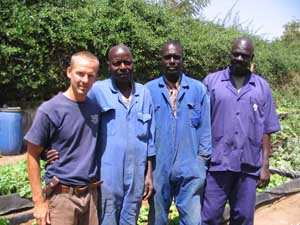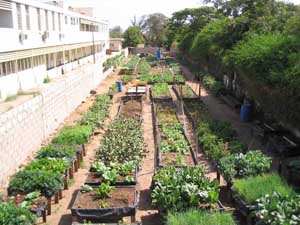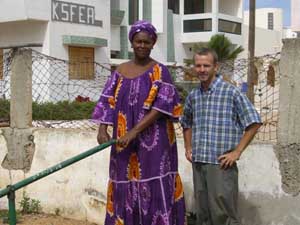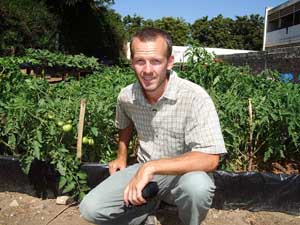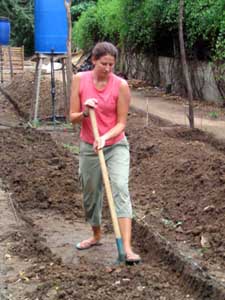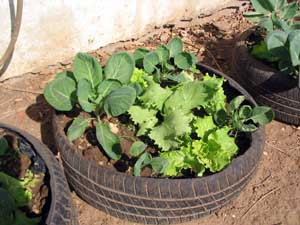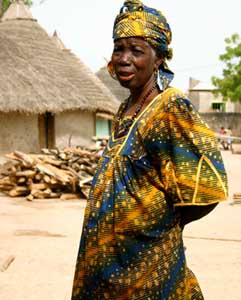-
- Dems court gay vote in Mass. governor race
- Conservative Jewish leader expects ban on gay rabbis to be lifted
- Parents upset over school’s plan to perform ‘Laramie Project’
- McGreevey to embark on national book tour
- Godfather of voguing, star of ‘Paris is Burning’ dies
- Book describes Rove’s relationship with gay stepfather
- National News Briefs
- World News Briefs
feature
San Diegan hopes to change the world, one micro-garden at a time
Published Thursday, 14-Sep-2006 in issue 977
For centuries, philosophers have pondered the nature and perils of a uniquely human condition: boredom. Danish theologian Soren Kierkegaard regarded it as “the root of all evil,” while others have warned that the road to self-destruction is paved with ennui and lassitude.
From the seeds of one man’s tedium, however, a garden of compassion and hope has sprouted. Meet San Diego resident Steve Bolinger, president and co-founder of Development in Gardening (DIG). A sort of modern-day Johnny Appleseed, the former Bourbon Street barback is on a quest to provide proper nutrition to people living with HIV and AIDS in poor nations throughout the world, one sweet potato at a time. His tools: a plot of land, some vegetable seed, old tires and the generosity of others.
Bolinger and DIG co-founder Sarah Koch will hold their first fund-raiser for the nonprofit organization from 1:00 to 3:00 p.m. this Saturday, Sept. 16, at Lei Lounge in University Heights. The event will include food, drinks and a silent auction filled with African arts, crafts and photographs from Bolinger’s time in Senegal, Africa. The cost is $25. DIG has already received $1,000 from the Rob Benson Foundation as a founding sponsor.
“A study recently published in the journal HIV Medicine states that patients starting antiretroviral therapy while malnourished are six times more likely to die than patients who are well-nourished.” Bolinger’s journey began after the easygoing, native Kansan moved to San Diego in 2001. Feeling at a crossroads in his life, he decided that the best way to keep from becoming stagnant was to indulge his wanderlust. Thus began a two-year excursion through mostly developing countries, where he began to volunteer his time, serving as an English teacher in Cambodia and elsewhere.
“I was kind of bored with my life here and just needed to go do something,” said Bolinger, 35. “I wanted to travel, volunteer and basically experience the world. I definitely wasn’t living out my purpose.”
Upon his return, Bolinger was inspired to pursue a career in humanitarian aid, though he found that most organizations sought people with more time and experience working abroad.
“Joining the Peace Corps was the best way to jump into that field of work and gain the experience and language skills,” he said.
During his 16-month stint with the Peace Corps, Bolinger was tasked with establishing a garden at a hospital in the Senegalese capital of Dakar, a crowded, Sub-Saharan city of cinder block and sand with a population of 2.5 million.
In just two months, Bolinger and a team of volunteer gardeners and patients had filled an empty back lot at Farr Hospital with lettuce, okra, eggplant, carrots, papaya, sweet potatoes, green peppers, tomato and herbs. Today, the life-giving plants sprout from the ground, old tires, PVC pipe and other found containers. The cost for the entire operation – which, within six months was producing more than 880 pounds of produce (enough to provide 920 patient meals each month) – was around $4,000. In its first year, the self-sustaining garden will provide close to four tons of produce and close to 11,040 meals for HIV/AIDS patients at Farr Hospital.
“World health leaders estimate that HIV infection rates in Africa will double by 2020, with 18 million children of parents with the disease orphaned by 2010.” “We try and make it as economical as we can for people,” said Bolinger, who majored in finance at Kansas State University. “Dakar is a very third-world city. You can’t just go out and buy planters, [but] there’s garbage everywhere. You can go along the streets, pick up tires, put some plastic in them and then put your soil inside and use them as your containers. We really look for things that we can recycle that [are] not costing anybody anything, like PVC pipe.”
In Africa, where AIDS remains the leading cause of death, DIG’s great green mission could mean the difference between life and death for some. A study recently published in the journal HIV Medicine states that patients starting antiretroviral therapy while malnourished are six times more likely to die than patients who are well-nourished. According to representatives of the United Nations World Food Program, proper nutrition is the most overlooked and under-funded element of care for people affected by HIV/AIDS in the world’s most impoverished countries. The United Nations Food and Agriculture Organization stated in 2003 that a “vegetable rich diet can bolster the immune system and help it fight against the disease … [helping] people to enjoy longer, more productive lives.”
World health leaders estimate that HIV infection rates in Africa will double by 2020, with 18 million children of parents with the disease orphaned by 2010.
Bolinger and Koch hope to combat the problem by teaching caretakers in Africa and, eventually, other countries, to grow fruits and vegetables needed to supply the nutrients lacking in people’s diets.
Multivitamins alone are usually not sufficient. Studies have shown that people living with HIV sometimes need between six and 25 times the recommended daily allowance of certain nutrients.
Before the establishment of the garden at Farr hospital, Bolinger said, most of the patients were subsisting on modest portions of macronutrients, calorie-rich foods like proteins, carbohydrates and fats that help the body maintain weight.
“Usually they would get some rice and a little piece of meat or a piece of fish,” he said.
However, the patients were receiving no micronutrients, the vitamins and minerals found in fruits and vegetables that keep cells working properly and help facilitate the overall response to antiretroviral treatment.
As part of their outreach, DIG also teaches people how to get the maximum nutritional benefit from their gardens.
“We’re also working with the kitchen and educating them on how to utilize more of the vegetables that they’re producing,” Bolinger said. “A lot of times they throw away the leaves of the beets, which are highly nutritious.”
Bolinger hopes to replicate the success of his garden in Dakar, installing similar models at hospitals and orphanages around the world. However, his first priority will be to return to Dakar and establish an outpatient garden to assist people with HIV and AIDS in the general populace.
“We’re going to form another garden for them, so they can supplement their own nutrition,” he said. “Income generation is a huge deal for them. A lot of these people, it’s hard for them to make a dollar [the average income per day]. We’re producing enough that they can sell the excess and start having some income from the garden.
“Oftentimes, they become a financial burden on the family because of their health,” Bolinger said. “This is a chance for them to start taking care of themselves and also contribute.”
Bolinger estimated that each successive garden will cost $4,000 to $5,000, from procuring the required labor and materials to training the caregivers and volunteers on crop rotation, garden maintenance and the use of organic pest control methods.
“My job is to really show them how to operate this new toy that they have [and] to keep it running,” said Bolinger, who got his first agricultural experience on the family farm in Kansas. He gleaned his education in urban micro-gardening from the Peace Corps.
Once a garden has been established, DIG will provide ongoing assessment and assistance as necessary. The efficacy of the program will be determined by administering a series of questionnaires to residential patients before, during and after they receive the garden’s vegetables. The study will assess the patients’ mental state, vitality, ability to take care of themselves and overall well-being.
Unlike many developing nations, the Senegalese government provides free access to AIDS drugs. However, families still face the prospect of losing income earners who are too sick to work or unable to work due to the stigma surrounding the virus, something Bolinger has observed firsthand.
“When we interviewed some of the patients, asking about their condition and if they appreciated the garden and the meals, most of them would not admit or say that they were HIV positive or had AIDS,” Bolinger said. “We did not push the question but it was evident they did not want it to be known.”
Bolinger plans to spend another nine months in Dakar establishing the outpatient gardens, then head to Togo, a tiny African country of about 5 million people. Eventually, he hopes to see gardens established in India, which has the second largest AIDS population in the world.
While there appears to be no cure on the horizon for either poverty or AIDS, working to combat both seems to have provided Bolinger with a calling and a cure for his boredom.
“This is definitely what I want to do with my life,” he said. “I feel this is my purpose.”
Lei Lounge is located at 4622 Park Blvd. For more information about the fund-raiser or DIG, visit www.developmentingardening.org.
|
|
Copyright © 2003-2025 Uptown Publications

